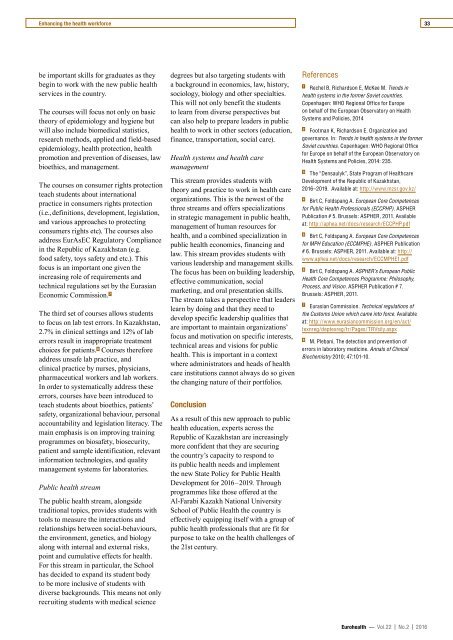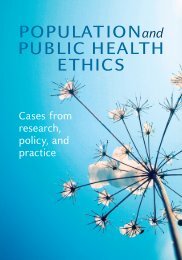EUROHEALTH
Eurohealth-volume22-number2-2016
Eurohealth-volume22-number2-2016
Create successful ePaper yourself
Turn your PDF publications into a flip-book with our unique Google optimized e-Paper software.
Enhancing the health workforce<br />
33<br />
be important skills for graduates as they<br />
begin to work with the new public health<br />
services in the country.<br />
The courses will focus not only on basic<br />
theory of epidemiology and hygiene but<br />
will also include biomedical statistics,<br />
research methods, applied and field-based<br />
epidemiology, health protection, health<br />
promotion and prevention of diseases, law<br />
bioethics, and management.<br />
The courses on consumer rights protection<br />
teach students about international<br />
practice in consumers rights protection<br />
(i.e., definitions, development, legislation,<br />
and various approaches to protecting<br />
consumers rights etc). The courses also<br />
address EurAsEC Regulatory Compliance<br />
in the Republic of Kazakhstan (e.g.<br />
food safety, toys safety and etc.). This<br />
focus is an important one given the<br />
increasing role of requirements and<br />
technical regulations set by the Eurasian<br />
Economic Commission. 7<br />
The third set of courses allows students<br />
to focus on lab test errors. In Kazakhstan,<br />
2.7% in clinical settings and 12% of lab<br />
errors result in inappropriate treatment<br />
choices for patients. 8 Courses therefore<br />
address unsafe lab practice, and<br />
clinical practice by nurses, physicians,<br />
pharmaceutical workers and lab workers.<br />
In order to systematically address these<br />
errors, courses have been introduced to<br />
teach students about bioethics, patients’<br />
safety, organizational behaviour, personal<br />
accountability and legislation literacy. The<br />
main emphasis is on improving training<br />
programmes on biosafety, biosecurity,<br />
patient and sample identification, relevant<br />
information technologies, and quality<br />
management systems for laboratories.<br />
Public health stream<br />
The public health stream, alongside<br />
traditional topics, provides students with<br />
tools to measure the interactions and<br />
relationships between social-behaviours,<br />
the environment, genetics, and biology<br />
along with internal and external risks,<br />
point and cumulative effects for health.<br />
For this stream in particular, the School<br />
has decided to expand its student body<br />
to be more inclusive of students with<br />
diverse backgrounds. This means not only<br />
recruiting students with medical science<br />
degrees but also targeting students with<br />
a background in economics, law, history,<br />
sociology, biology and other specialties.<br />
This will not only benefit the students<br />
to learn from diverse perspectives but<br />
can also help to prepare leaders in public<br />
health to work in other sectors (education,<br />
finance, transportation, social care).<br />
Health systems and health care<br />
management<br />
This stream provides students with<br />
theory and practice to work in health care<br />
organizations. This is the newest of the<br />
three streams and offers specializations<br />
in strategic management in public health,<br />
management of human resources for<br />
health, and a combined specialization in<br />
public health economics, financing and<br />
law. This stream provides students with<br />
various leadership and management skills.<br />
The focus has been on building leadership,<br />
effective communication, social<br />
marketing, and oral presentation skills.<br />
The stream takes a perspective that leaders<br />
learn by doing and that they need to<br />
develop specific leadership qualities that<br />
are important to maintain organizations’<br />
focus and motivation on specific interests,<br />
technical areas and visions for public<br />
health. This is important in a context<br />
where administrators and heads of health<br />
care institutions cannot always do so given<br />
the changing nature of their portfolios.<br />
Conclusion<br />
As a result of this new approach to public<br />
health education, experts across the<br />
Republic of Kazakhstan are increasingly<br />
more confident that they are securing<br />
the country’s capacity to respond to<br />
its public health needs and implement<br />
the new State Policy for Public Health<br />
Development for 2016 – 2019. Through<br />
programmes like those offered at the<br />
Al-Farabi Kazakh National University<br />
School of Public Health the country is<br />
effectively equipping itself with a group of<br />
public health professionals that are fit for<br />
purpose to take on the health challenges of<br />
the 21st century.<br />
References<br />
1<br />
Rechel B, Richardson E, McKee M. Trends in<br />
health systems in the former Soviet countries.<br />
Copenhagen: WHO Regional Office for Europe<br />
on behalf of the European Observatory on Health<br />
Systems and Policies, 2014<br />
2<br />
Footman K, Richardson E. Organization and<br />
governance. In: Trends in health systems in the former<br />
Soviet countries. Copenhagen: WHO Regional Office<br />
for Europe on behalf of the European Observatory on<br />
Health Systems and Policies, 2014: 235.<br />
3<br />
The “Densaulyk”, State Program of Healthcare<br />
Development of the Republic of Kazakhstan,<br />
2016 – 2019. Available at: http://www.mzsr.gov.kz/<br />
4<br />
Birt C, Foldspang A. European Core Competences<br />
for Public Health Professionals (ECCPHP). ASPHER<br />
Publication # 5. Brussels: ASPHER, 2011. Available<br />
at: http://aphea.net/docs/research/ECCPHP.pdf<br />
5<br />
Birt C, Foldspang A. European Core Competences<br />
for MPH Education (ECCMPHE). ASPHER Publication<br />
# 6. Brussels: ASPHER, 2011. Available at: http://<br />
www.aphea.net/docs/research/ECCMPHE1.pdf<br />
6<br />
Birt C, Foldspang A. ASPHER’s European Public<br />
Health Core Competences Programme: Philosophy,<br />
Process, and Vision. ASPHER Publication # 7.<br />
Brussels: ASPHER, 2011.<br />
7<br />
Eurasian Commission. Technical regulations of<br />
the Customs Union which came into force. Available<br />
at: http://www.eurasiancommission.org/en/act/<br />
texnreg/deptexreg/tr/Pages/TRVsily.aspx<br />
8<br />
M. Plebani, The detection and prevention of<br />
errors in laboratory medicine. Annals of Clinical<br />
Biochemistry 2010; 47:101-10.<br />
Eurohealth — Vol.22 | No.2 | 2016
















